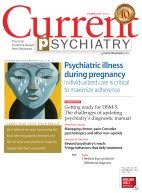
Henry A. Nasrallah, MD
Editor-in-Chief
As a National Institutes of Health-trained psychopharmacologist who also received substantial psychotherapy training during residency, I value both as pillars of psychiatric practice.
However, often I think about the evidence-based conduct of psychotherapy, which I regard as a neurobiologic treatment similar to drug therapy, and then I ask research questions that remain unanswered, such as:
What is the therapeutic “dose” of psychotherapy? Does it differ by type of therapy or the patient’s diagnosis?
Is the dose measured in the number of sessions or the time the patient is in a therapy session? Is there a loading dose? What is the maintenance dose?
What is the optimal schedule for psychotherapy? By what established criteria does a therapist determine how often to administer psychotherapy? Why weekly and not daily? Why not 2 or 3 times a day intensive psychotherapy for acutely ill patients? Is the scheduling based on the cost to the patient, the therapist’s availability, or insurance coverage rather than the patient’s needs?
Read full text (free access)


Some answers:
ReplyDelete-Indication for a given psychotherapy: If the only tool you have is a hammer...
-Best time of day: bedtime, if the psychotherapist suffers from insomnia.
-Psychotherapy overdose: Woody Allen
-Me too psychotherapies: EMDR, TFT
-Adherence: Whether it's emotional cheeking or intellectual cheeking, it's called resistance. And blamed on the patient.
-Brand name vs generic: Generic "therapy" cannot be marketed as effectively.
Here are some of The Real Reasons Psychiatrists Want to Provide Psychotherapy